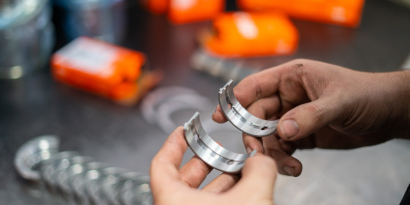The Expert already knows that the day-to-day work of the mechanical workshop involves much more than just technical knowledge about automobiles. For the business to prosper, it is also critical to master planning, organization, and relationship skills with customers and suppliers — in addition to avoiding some common mistakes in workshop management that can compromise the success of the business.
Many mechanicals, although highly qualified in technical service, end up facing difficulties in expanding the operation and standing out in the market due to some “stumbling blocks”. These are mistakes that, if not corrected, can prevent the sustainable growth of the workshop and even affect the reputation of the repairer. But do not worry: In this article, we will further explore these mistakes and show you how to get around them. Stay with us and enjoy reading!
List: Check out 5 common mistakes in workshop management and learn how to avoid them
Below, we list some of the common mistakes in workshop management that, traditionally, end up accumulating and being left aside in the rush of everyday life. And it is worth mentioning that by avoiding these pitfalls and applying good management practices, owners can significantly improve their competitiveness, optimize operations and build a more loyal and recurring customer base. So take note:
1 – Lack of strategic planning
One of the big common mistakes in workshop management is the absence of clear strategic planning. Many owners focus only on the daily routine, without setting growth goals or creating a plan to achieve those goals, causing the business to stagnate, without a precise direction. Not to mention that a lack of planning can lead to impulsive decisions and the absence of control over operating costs and profit margins.
Here, the tip is to create a strategic plan that defines short-, medium-, and long-term goals. This includes establishing the desired growth, the investments required, and how to increase the customer base. Oh, and remember to regularly review this plan to adjust it as the market and workshop needs change.
2 – Incorrect pricing of services
Another common mistake is related to inadequate pricing of services. Many Experts do not consider all the costs involved in the work — such as labor, parts, and taxes —, and end up charging prices that are not profitable. Charging too cheap hurts the profit margin, while prices that are too high drive customers away.
Therefore, it is worth conducting a detailed analysis of the workshop’s operating costs and establishing pricing based on a sustainable profit margin. Additionally, compare prices to those charged by competitors in the region, adjusting their values to keep competitive without sacrificing profitability.
3 – Disorganization in inventory management
Maintaining proper control of the inventory of parts and inputs is vital for the operation efficiency. This is one of the common mistakes in workshop management that causes the business to face problems of lack or excess of items, which can cause delays in services or unnecessarily immobilize capital in products that do not have high turnover.
In this situation, the ideal is to implement an inventory management system that allows you to accurately monitor the number of parts and inputs available. Use software that facilitates the control of product entry and exit and make a periodic analysis to adjust everything according to the actual demand. This will help to avoid waste and optimize the workshop’s cash flow.
4 – Lack of a good customer relationships
In a competitive market, customer service is a factor that can determine the success or failure of a mechanical workshop. The lack of clear communication and quality service can drive customers away, even if the technical service is of good quality. Do not forget that, in any business model, consumers who feel ignored or poorly served hardly return.
So, consider investing in excellent customer service. Establish transparent and honest communication, explaining the services performed and the costs involved. In addition, offer personalized service, creating an environment of trust and customer loyalty. A good after-sales relationship is also important to ensure that they come back and recommend your services to others.
5 – Problems with suppliers
Finally, we cannot fail to highlight that maintaining a good relationship with suppliers is crucial to ensure the parts’ quality and punctuality in deliveries. Many workshop owners do not dedicate enough time to cultivating these relationships, which can lead to delays in parts replacements, increased costs, and even lack of confidence in supply.
So, try to create solid partnerships with your suppliers, prioritizing those that offer not only competitive prices, but also quality and punctuality. Negotiate delivery deadlines and payment terms that are advantageous for both of you, and always keep an open communication channel. A workshop that relies on good suppliers is more likely to offer an efficient and uninterrupted service.
And speaking of a reliable supplier, always count on RIO!
Avoiding these common mistakes in workshop management is essential to ensure that your business continues to thrive and stand out in the market. By implementing solid strategic planning, correctly pricing your services, keeping the inventory organized and focusing on maintaining good relationships with customers and suppliers, your workshop can operate more efficiently and profitably.
And in this respect, RIO is the ideal partner of the Expert who never gives up working with top quality components. Here, you will find a complete portfolio of spare parts for your workshop that guarantee unrivaled performance and durability. Visit our catalog, learn more about our solutions, and count on us to create movement!





